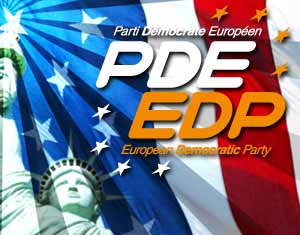17.05.2009
May 14, 2009 (the date of publication in Russian)
Ruslan Kostuk, Anna Varkina
PATENTED OBAMOCRATS
What future lies ahead of the "European subsidiary" of the US Democratic Party?
 Last months showed there were too many political powers in Western Europe, trying to show their love and devotion to the new US Democratic administration. But we suppose the brightest adepts of the new owner of the White House are those, who are called partners №1 by the very US Democrats. The European Democratic Party (EDP) is a representative of such structures on the lever of European trans-national parties.
Last months showed there were too many political powers in Western Europe, trying to show their love and devotion to the new US Democratic administration. But we suppose the brightest adepts of the new owner of the White House are those, who are called partners №1 by the very US Democrats. The European Democratic Party (EDP) is a representative of such structures on the lever of European trans-national parties.
Of course, the EDP doesn't try to position itself as a filial of the US Democratic Party on the level of policy announcements. The EDP, created on the initiative of French and Italian politicians in 2004, distinguishes itself as a centrist party. The founding declaration of the EDP said: "We need a new political force, which is neither conservative nor socialist and is devoted to the promotion of European ideal".
On the other hand, the EDP interacts with the US Democrats actively; for example, they created the "International Democrat Union" in 2006. Romano Prodi, the President of the European Commission since 1999 to 2004 and Italian ex-prime minister, is an honored chairman of the EDP; Francois Bayrou, the president of Union for French Democracy, and Francesco Rutelli, one of the Italian Democratic Party leaders, are the present chairmen. Actually, the mentioned parties are the most influential and strong in the EDP. The Labour Party of Lithuania, the Basque National Party (of Spain) are included in the EDP besides them. As a rule, the EDP member parties represent opposition in their native countries and mostly occupy social-liberal niche, being in Procrustean bed between social-democracy and the Right center.
Inside the EP those European parliamentarians who belong to the EDP (as we've mentioned already, they are mostly from Italy and France) take part in the work of the Alliance of Democrats and Liberals for Europe fraction, which is ruled by European liberals. In general, there are 25 representatives of EDP in the European Parliament. According to pre-election documents of 2009, the EDP is ready to keep strategic alliance with liberals. European Democrats, as well as the European Liberal Democrat and Reform Party, stands up for any kind of the development of integration processes inside the EU. Considerable widening of the European Parliament powers, making the European Commission more independent, widening qualified majority voting in the EU Council of Ministers – these are measures offered. Simultaneously Euro-"obamites" want to continue the "democratization on the EU political institutes", acting in the name of "propagation of ideals of solidarity and freedom".
Confirming the righteousness of "the model of social market economy", Barack Obama's European allies call upon to improve and develop the realization of common economic projects and policies on the level of the EU in transport, energy and communications spheres. The special attention is paid to the growth of budget assigned for education and innovational-research policy. This postulate distinguishes the EDP from, for example, the European People's Party. Also the EDP demands widening of "cultural and linguistic difference" (which in reality means spreading of the English language) in the limits of united Europe.
European democrats share liberals' postulate about citizens, but not states being in the center of the European project. It is mentioned in the EDP pre-election program: "We want Europe of the people and not Europe of the States in order to increase the feeling of identity to the community".
But in the sphere of foreign policy the EDP holds the positions of "reasonable atlanticism". Not challenging the Euro-Atlantic choice, the EDP insists on the NATO being based on two equal foundations – American and European. Simultaneously both liberals and democrats insist on the EU speaking in a "united voice" in international organizations and during international conflicts (we could observe what this is on practice during numerous disputes with Russia, caused by the Eastern European "young democracies" every time).
What perspectives do lie ahead of liberal centrism? Obviously, during the global crisis it's really hard to stay between the biggest and the most powerful political structures. Thinking pragmatically, centrism is far not the best way out of the situation. And in general the destiny of the very EDP is under a question now. As it was created by a coalition of social-centrist Italian powers named "Margherita" ("The Daisy") and headed by Francesco Rutelli and Romano Prodi, which has recently mixed with ex-communists in the Democratic Party.
Meanwhile the ideological image of the party stays fuzzy. The Italian Democratic Party holds discussions of the question of the EDP joining the European Socialist Party, which is more powerful and famous. That's why we can conclude, that announcing yourself being a "favorite friend" of the US President isn't enough to keep your political line in modern Europe.
Number of shows: 1963
 ENG
ENG 

 ENG
ENG 
